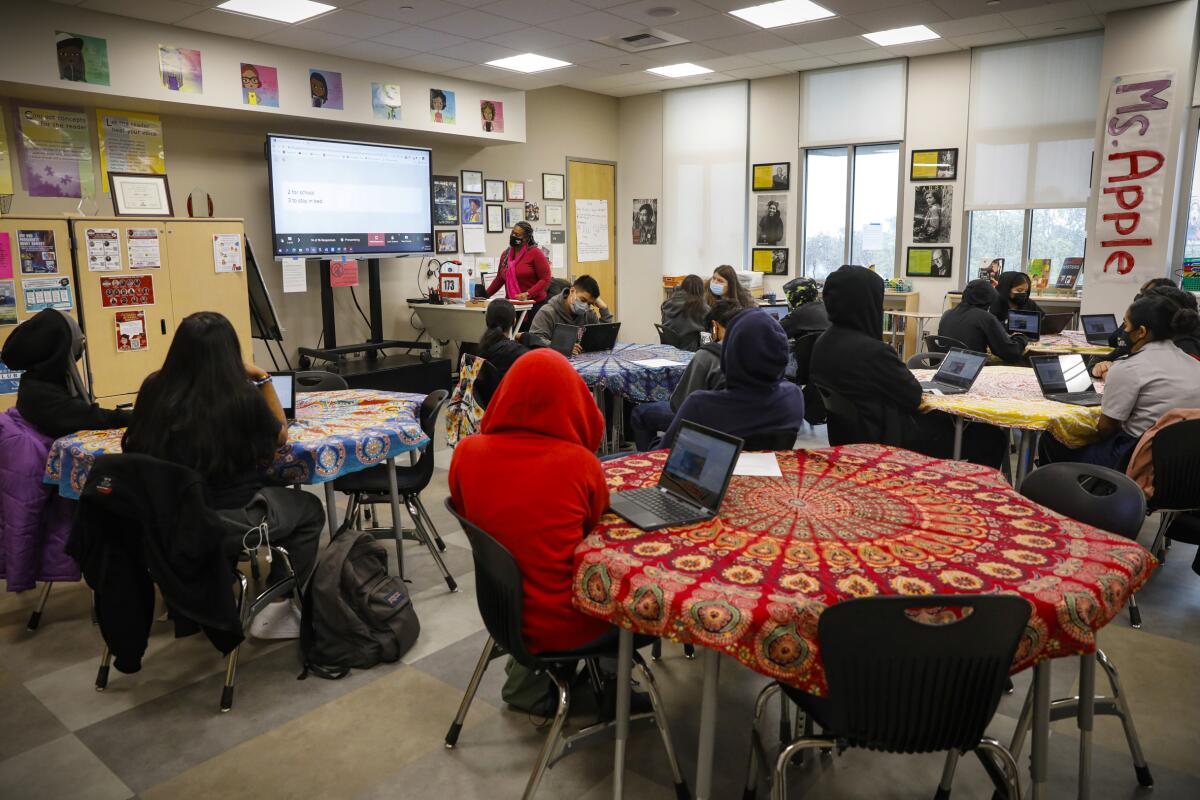California to remove Mayan affirmation from ethnic studies after lawsuit argues it’s a prayer

- Share via
SAN DIEGO — California is deleting the often-used In Lak’Ech affirmation from its model ethnic studies curriculum to settle a lawsuit from a San Diego group that claims the affirmation constitutes an Aztec prayer.
The California Department of Education also is removing an Ashe affirmation from the curriculum. Ashe is a concept from the Yoruba people of Nigeria that refers to the power to effect change. The lawsuit argued it constitutes a religious chant.
Last year, California became the first state to make ethnic studies a high school graduation requirement. It will be required starting in 2026.
This lawsuit is one of the first major legal challenges to the state’s model curriculum, which was finalized in March to serve as a recommendation, but not a requirement, for schools.
In September, a group called Californians for Equal Rights Foundation, along with three San Diego parents, sued California education officials over the affirmations included in the curriculum. They accused the state of violating the Establishment Clause of the state constitution, which prohibits the state from supporting a religion.
The foundation is one of several groups in San Diego that has been fighting anti-racism initiatives in K-12 schools, labeling such efforts as “critical race theory.”
Although state officials denied the lawsuit’s allegations, they agreed to the settlement last week to avoid further litigation costs, according to the settlement agreement. State officials are not admitting any liability.
State officials also said in the agreement that they believe the deletions would be consistent with their “long-standing commitment to ensuring appropriate treatment of religion in a secular public education context.”
The settlement requires that state education officials notify all school districts, charter schools and county offices of education of the deletions. The state must also refrain from encouraging the use of the affirmations and advise all public schools that none of the model ethnic studies curriculum should be used as a prayer or religious act.
The state education department also will pay $100,000 for the plaintiffs’ attorneys fees. In exchange, the plaintiffs will dismiss the lawsuit.
“We are encouraged by this important, hard-fought victory,” Frank Xu, president of Californians for Equal Rights Foundation, said in a statement. “Our state has simply gone too far in attempts to promote fringe ideologies and racial grievance policies, even those that disregard established constitutional principles. Endorsing religious chants in the state curriculum is one glaring example.”
Many ethnic studies teachers say In Lak’Ech is used not as a prayer but as an affirmation, to help instill in students positive values such as respect and empathy. In Lak’Ech is based on a Mayan philosophy that means “You are my other me.”
The state’s model ethnic studies curriculum included a poem that playwright Luis Valdez wrote about In Lak’Ech. The poem is frequently recited in high school ethnic studies classes in California: “You are my other me. If I do harm to you, I do harm to myself. If I love and respect you, I love and respect myself.”
The model curriculum also included a longer chant based on In Lak’Ech and the Aztec concept of Nahui Ollin, also called the Four Movements. Nahui Ollin involves four concepts — self-reflection, knowledge, action and transformation — which are represented by the names of four Aztec gods. The chant also includes the name of a fifth Aztec god.
Californians for Equal Rights Foundation said the curriculum’s chant was invoking the names of Aztec deities and asking for their intercession. Some experts disagree, saying Nahui Ollin is a concept, not a prayer.
Californians for Equal Rights Foundation has spent several months working against initiatives such as ethnic studies courses and equity training for school staffers. The group is part of a national conservative-led movement that claims schools’ anti-racist initiatives are racially divisive, indoctrinate political ideologies into students, and label students of color as victims and white students as oppressors.
Educators and anti-racism advocates say ethnic studies courses in K-12 schools are not teaching critical race theory, which is a university-level discipline that examines how systemic racism is perpetuated by law. They say they worry that the national push against critical race theory seeks to eliminate needed conversations about how race and racism have shaped history.
More to Read
Sign up for Essential California
The most important California stories and recommendations in your inbox every morning.
You may occasionally receive promotional content from the Los Angeles Times.











